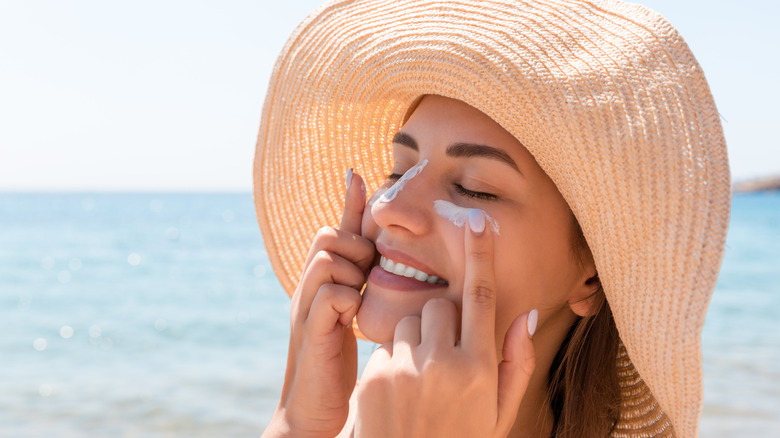The Biggest Concern Dermatologists Want You To Know About This Summer
Dermatologists, while always helpful for skin conditions, are truly a necessity for more than eczema and acne. The knowledgeable doctors can assist with appropriate product recommendations, advice for aging skin, and, most importantly right now, suggestions for keeping the skin healthy during the summer season.
The hot weather causes some changes to the skin, including dehydrating it, which may have you confused as your skin may sweat and feel moist in the blazing heat! According to the American Academy of Dermatology Association (AAD), the hot weather promotes water loss which leads to dehydration and causes red, dry, and irritated skin. The sun, pool, and air conditioning can cause your skin to become dry and irritated, so a lighter (but proper) hydrating summer skincare regimen is crucial.
Nava Greenfield, board-certified dermatologist and medical director at Schweiger Dermatology Group in New York, told Allure, "Despite the weather being hot and humid, you still need to moisturize."
In addition to our skincare, dermatologists remind us to switch out our winter makeup for pore friendly non-comedogenic makeup. The experts who spoke with Today agreed — ensuring your summer products are made without pore-clogging ingredients is going to help keep your skin blemish free.
Skin protection is crucial for preventing sun damage
The most critical tip dermatologists want to drive home for the summer of 2021, and (spoiler!) every summer, is to protect your skin by using SPF, staying in the shade, and wearing sunglasses. The Skin Cancer Foundation reported that UV radiation can reach you in places you may not even realize, and no sunscreen is entirely foolproof, but it is still very important to protect your skin with a layer of sunblock. It is from the little noticed sun damage that, over time, causes wrinkles, age spots, and even skin cancer.
The dermatologists who spoke with Allure all recommended wearing sun-protective clothing, hats, and sunglasses in the sun, as well as avoiding midday sun exposure, between 10 a.m. and 4 p.m. (we know that's when tanning time is, but we're in the business of protecting your skin). As for SPF, two tablespoons worth of broad-spectrum sunscreen with SPF 30 or higher should applied 30 minutes before sun exposure and reapplied every two hours (via Skin Cancer Foundation).
Omer Ibrahim, board-certified dermatologist and co-director of clinical research at Chicago Cosmetic Surgery and Dermatology, reminded us to "...make sure to pack extra sunscreen for longer summer days outdoors," via Allure. So don't forget to spray every inch of your body in sunscreen this summer, you won't regret it.

